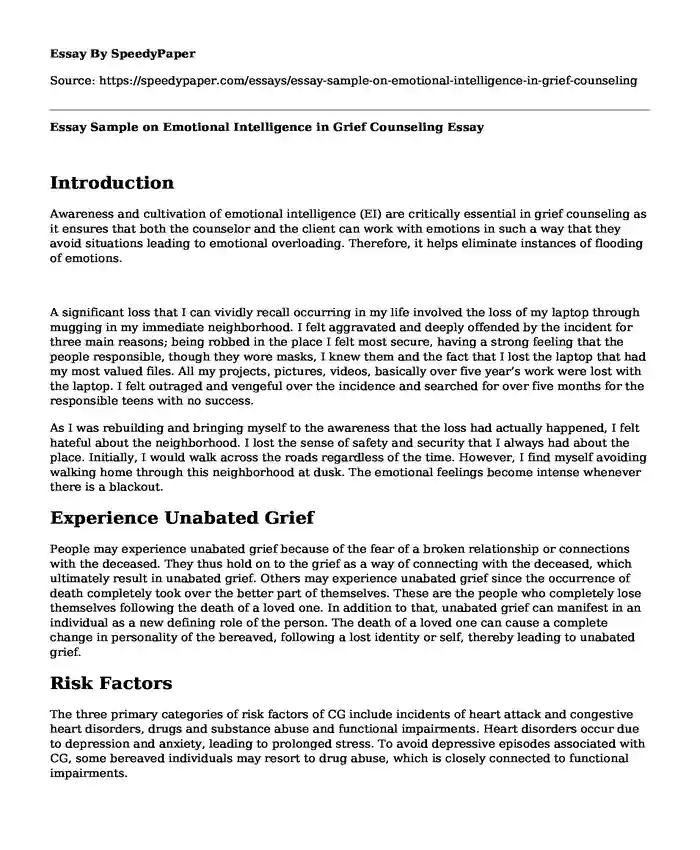
| Type of paper: | Essay |
| Categories: | Counseling Emotional intelligence |
| Pages: | 3 |
| Wordcount: | 731 words |
Introduction
Awareness and cultivation of emotional intelligence (EI) are critically essential in grief counseling as it ensures that both the counselor and the client can work with emotions in such a way that they avoid situations leading to emotional overloading. Therefore, it helps eliminate instances of flooding of emotions.
A significant loss that I can vividly recall occurring in my life involved the loss of my laptop through mugging in my immediate neighborhood. I felt aggravated and deeply offended by the incident for three main reasons; being robbed in the place I felt most secure, having a strong feeling that the people responsible, though they wore masks, I knew them and the fact that I lost the laptop that had my most valued files. All my projects, pictures, videos, basically over five year’s work were lost with the laptop. I felt outraged and vengeful over the incidence and searched for over five months for the responsible teens with no success.
As I was rebuilding and bringing myself to the awareness that the loss had actually happened, I felt hateful about the neighborhood. I lost the sense of safety and security that I always had about the place. Initially, I would walk across the roads regardless of the time. However, I find myself avoiding walking home through this neighborhood at dusk. The emotional feelings become intense whenever there is a blackout.
Experience Unabated Grief
People may experience unabated grief because of the fear of a broken relationship or connections with the deceased. They thus hold on to the grief as a way of connecting with the deceased, which ultimately result in unabated grief. Others may experience unabated grief since the occurrence of death completely took over the better part of themselves. These are the people who completely lose themselves following the death of a loved one. In addition to that, unabated grief can manifest in an individual as a new defining role of the person. The death of a loved one can cause a complete change in personality of the bereaved, following a lost identity or self, thereby leading to unabated grief.
Risk Factors
The three primary categories of risk factors of CG include incidents of heart attack and congestive heart disorders, drugs and substance abuse and functional impairments. Heart disorders occur due to depression and anxiety, leading to prolonged stress. To avoid depressive episodes associated with CG, some bereaved individuals may resort to drug abuse, which is closely connected to functional impairments.
Treatment Modalities
The first step in the treatment modalities for the traumatic overlay is slowing down the grieving process to avoid undesirable in-depth experiences that could result in flooding and overloading of the client. Thus, the counselor needs to focus on small chunks of the experiences and slowly to dive deeper through the client’s outlines of the experience. While doing this, the counselor needs to enhance slow breathing pattern, giving breaks and ensure that they both remain connected with the client in the room. In addition to this, the counselor can apply therapeutic processes of cognitive behavioral therapy (CBT) and meaning reconstruction therapy. On the one hand, CBT helps in bringing to the surface the hidden negative cognitions surrounding the loss. On the other hand, meaning reconstruction therapy helps in the removal of acute grief symptoms.
Three Modalities
It involves the recommendations of various medical remedies for the symptoms exhibited by the bereaved. The counselor’s role, in this case, is to identify the medical remedies that work best with the clients. Medication is particularly useful when the client demonstrates depression symptoms such as lack of sleep, anxiety or poor functionality.
The modality involves directing the client to the many available social supports that can help deal with CG. It helps eliminate the prejudice of stigma associated with prolonged grieving.
This is a modality that entails calling the client’s attention to the realization that the death of a loved one had a larger meaning. The advantage of advocacy and empowerment is to gain personal power, thereby eliminating a sense of powerlessness that the bereaved may be experiencing.
Conclusion
Thus, traumatic grief refers to the intense sadness portrayed by elevated anxiety as a result of the sudden or greasy loss of a loved one. An excellent example of traumatic grief is the loss of a closely attached individual, particularly in palliative care.
Cite this page
Essay Sample on Emotional Intelligence in Grief Counseling. (2024, Jan 11). Retrieved from https://speedypaper.net/essays/essay-sample-on-emotional-intelligence-in-grief-counseling
Request Removal
If you are the original author of this essay and no longer wish to have it published on the SpeedyPaper website, please click below to request its removal:
- Essay Example for You: Race and Ethnicity
- Money as Motivation Essay Samples
- Gender Roles Established in Television - Free Essay for Everyone
- Essay Example: Facebook and the Regulations in Politics
- Essay Sample. Indigenous Resurgence
- Free Essay Example. Informed Comedy
- Puerto Rico Carrion - Essay Sample
Popular categories




